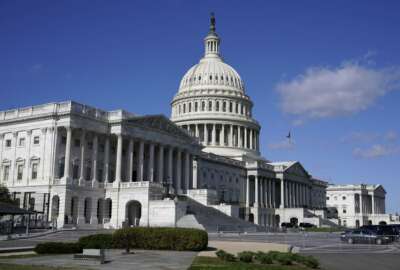
The case for a COVID-19 commission
When things go wrong and affect a lot of people, the government sometimes appoints commissions to do after-the-fact analysis and come up with recommendations for...
Best listening experience is on Chrome, Firefox or Safari. Subscribe to Federal Drive’s daily audio interviews on Apple Podcasts or PodcastOne.
When things go wrong and affect a lot of people, the government sometimes appoints commissions to do after-the-fact analysis. And come up with recommendations for congresses and administrations to try and prevent recurrences. Our guest says we need a COVID-19 Commission. Elaine Kamarck is senior fellow in governance studies at the Brookings Institution. She spoke with Federal Drive with Tom Temin.
Interview transcript:
Elaine Kamarck: The temptation is going to be to sort of blame everything that went wrong on Donald Trump. And Lord knows there’s plenty to blame on Donald Trump. I mean, it’s this rather spectacular failure of leadership on his part. But that would be the easy way out. We’re clearly in for a period of time of lots of crises, and mostly due to climate change, whether these are climate events, whether they’re different kinds of pandemics, whether they’re food problems, water problems, etc, we can look ahead and say bad things are going to happen. And I think that it would be sensible to take some time to sit back to look at the COVID response and ask, okay how can the federal government and the state governments do better? What did we do right? What did we do wrong? And how can we be prepared for what I call Black Swan events, really unusual events for which there’s no precedent?
Tom Temin: Is there anything to be learned from, say, the 911 Commission, with the understanding that was a one time shock event, but it wasn’t the drawn out type of thing that wrecked the economy?
Elaine Kamarck: Well, a lot was learned. I mean, I think what the 9/11 Commission showed was that we have a government that’s huge, that in the intelligence area has lots and lots and lots of assets, and knows lots and lots of things. But the problem we saw in 9/11 was that in spite of this huge capacity, we had problems connecting the dots. And that’s what the 911 Commission focused on. That’s what it showed us. And I think there’s been a fair amount of progress made in our intelligence community since them on connecting the dots. So those are the sorts of things that when it’s over, and we sit back, and we look at the event, those are the sorts of things that we say, okay let’s see if we can do this better.
Tom Temin: And what would this commission look like? How would it operate?
Elaine Kamarck: Well, these commissions when they’ve been successful, they are almost always bipartisan. They are often sponsored by Congress, which means that they have sufficient appropriation to do the work. They often have subpoena power to call people to testify. And clearly, it should be composed of people who know something about government at the state, local and the federal level. And these people should sort of look at everything from FDA to CDC to the oversight of HHS, and look at all the areas of government, the state government, state health departments, the public health service, I mean, I could go on and on. But you guys know as well as I do. Look at all of those aspects and say, okay what went right and what went wrong? And what were the barriers that if they’d not been there, we could have done a better job?
Tom Temin: Isn’t there also, though, a large body of work done to some extent, and the whole idea of community and state level resilience that is resident in the Homeland Security Department?
Elaine Kamarck: Absolutely. And that’s actually one of the things that I think we’re gradually learning here, which is that when it comes to response, when it comes to governmental response, in crises, there’s huge similarities whether the crisis is caused by a plane smashing into an office building, or a hurricane, or a dirty bomb in a city, or a long lasting pandemic, you need a government that has agility and the ability to work across lines. And every time we evaluate one of these responses, I think we get a little bit better at the next one.
Tom Temin: And that idea of bipartisanship, maybe it’ll get a little easier in the next Congress, because it’s so close to 50/50. Not only in the Senate, but in the House too.
Elaine Kamarck: Sure. And also, look, we have a president elect in Joe Biden, who is somebody who has done lots of congressional negotiations in the past. He’s kind of the polar opposite in that respect from Donald Trump, who never negotiated anything with the United States Congress and wasn’t very good at it. And every time Congress went up to the White House, they got into a big fight. So I mean, I think the bar is pretty low, given Trump’s record there. And I think that Biden’s background makes him really one of the most capable presidents we’ve had in a long time when it comes to dealing with Congress. Put it this way Congress is different, it is more polarized, but if anybody can do it, it’s probably Joe Biden.
Tom Temin: Of course, maybe we should wait, as you said earlier to see what his COVID response looks like after a year so to make sure that one works.
Elaine Kamarck: Right, exactly.
Tom Temin: Alright so then you would have, I guess, an agenda out of that for administration’s and for congresses, but there’s also the issue of federalism. And one of the tensions I think in the COVID response has been, what should the federal government mandate? And then within the states, even as we speak, there are arguments over what should governor’s mandate, what should counties be able to do, and so on. And so you’ve got that issue of, well, we know our community best. And then you’ve got the overlying science about how spreads can happen, or whatever the case might be. And so that would seem to be kind of a sticky wicket also, the federalism piece of it.
Elaine Kamarck: Well, that’s right. But we go back to 9/11, that was also a sticky wicket when it came to 9/11 because the whole issue of intelligence sharing. Until 9/11, intelligence was sort of the preserve of the national government. And then we realized that no no no, policeman on the beat were likely to come across terrorist activity. And so when you were fighting terrorism, you had to involve law enforcement all the way from the CIA, through the FBI, down to state troopers and local police. And so we always have to cope with the federalism angle when we are responding to crises, and this is no different.
Tom Temin: And I have not read it. But I have read about it, meta read it, I suppose you might say that George W. Bush, when he was president was intrigued by the idea that a pandemic could affect the country. And there was a couple year effort to create a pandemic response plan. There’s probably something in there that could be maybe unshelved and put into this mix, do you think?
Elaine Kamarck: I think so. And also, to add to that, listen, it was Bush and then Obama, because he had to deal with the Ebola crisis, created an office in the National Security Council that did nothing but look at global pandemics. So I’m sure that that was dismantled by Trump. But I’m sure that those government officials are still around someplace, and I’m sure they know a great deal. The fact of the matter is that there are pieces of this all over the place, just like there were pieces all over the place warning America how terrorism had changed with Osama Bin Laden, but sort of putting them in one place and saying, okay, government, let’s fix ourselves so we’re better for the next time. None of this is a blame game, right. Plenty of blame will be cast on Trump and the governors of some of these states that still refuse to have a mask mandate, etc. There’ll be that kind of blame. But what I’m talking about here is something that’s more systemic that looks at this in a less partisan way.
Tom Temin: And this is not a technology discussion but you mentioned some of the sharing the dots and data sharing initiatives that came out of 9/11. Now we have artificial intelligence. And we have a government that is very data oriented, we have Chief Data officers. Iit seems like many of the answers for a cogent response lie in what we already know if we can only discover and make use of what is known.
Elaine Kamarck: Right. That’s the 9/11 story and this story, too. We already know a huge amount in the federal government. We have a big federal government. It’s filled with smart people, and we know lots of things, but we miss lots of things too, in part because of the sheer size of the thing.
Copyright © 2025 Federal News Network. All rights reserved. This website is not intended for users located within the European Economic Area.
Tom Temin is host of the Federal Drive and has been providing insight on federal technology and management issues for more than 30 years.
Follow @tteminWFED





